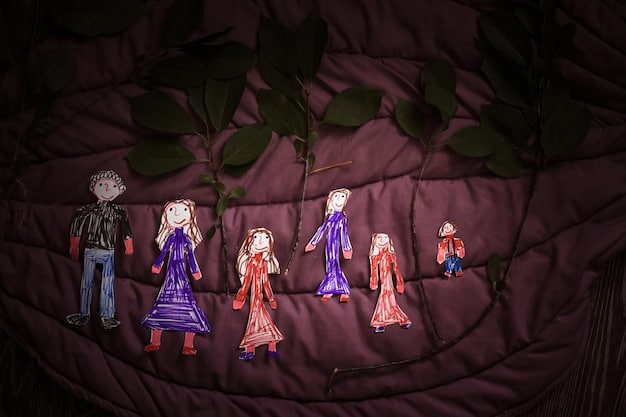Limited Series vs Anthology Series: Key Differences Explained

Understanding the nuanced differences between limited series and anthology series is crucial for viewers seeking specific storytelling experiences, impacting everything from character development to overall narrative structure.
Navigating the vast landscape of television series can be overwhelming, especially when trying to distinguish between different formats.
When trying to find what suits your streaming needs, understanding limited series vs. anthology series is essential. This guide will clarify what sets them apart, helping you choose your next binge-worthy show with confidence.
Limited Series vs. Anthology Series: Decoding the Formats
The world of television offers a variety of viewing options, and understanding the nuances between different formats can greatly enhance your viewing experience. The main question is: are you looking for a commitment to one storyline or a fresh start with each episode or season?
Let’s dive deeper into what defines a limited series and an anthology series.
What is a Limited Series?
A limited series, also known as a mini-series, tells a complete, self-contained story within a predetermined number of episodes. Unlike ongoing series with indefinite seasons, limited series are designed to have a beginning, middle, and end, wrapping up all narrative threads by the finale.
What is an Anthology Series?
An anthology series presents a different story, set of characters, and sometimes even a different theme in each episode or season. While each installment is self-contained, anthology series often maintain a consistent tone, style, or thematic exploration across all episodes or seasons.
Choosing between a limited series and an anthology series depends on your viewing preferences. Here are some factors to consider:
- Closure: If you appreciate a story with a definitive ending, a limited series will provide satisfaction.
- Commitment: Anthology series offer the flexibility of enjoying self-contained stories without a long-term commitment.
- Variety: Anthology series expose you to different narratives, characters, and settings in each installment.
Understanding the distinction between limited series and anthology series allows you to curate your viewing list based on your specific tastes and preferences, ensuring a more enjoyable and fulfilling television-watching experience.
Key Characteristics of a Limited Series
Limited series have become increasingly popular due to their ability to deliver focused, high-quality storytelling within a concise format. These shows offer viewers a complete narrative journey without the need for multiple seasons.
Here are the key characteristics that define limited series:
Complete Story Arc
Limited series present a single, complete story arc, offering a satisfying beginning, middle, and end within a finite number of episodes. This structured narrative ensures that all plot points are resolved, and character arcs are fully developed.
Predetermined Number of Episodes
These series are designed with a predetermined episode count, typically ranging from six to ten episodes. This fixed length allows creators to carefully pace the story, ensuring that each episode contributes meaningfully to the overall narrative.

Focused Character Development
With a concentrated storyline, limited series often provide rich and nuanced character development. Viewers get to explore the motivations, relationships, and growth of characters in depth, adding emotional resonance to the narrative.
Understanding these key characteristics can help viewers appreciate limited series for their tightly crafted stories, compelling characters, and satisfying resolutions. This format allows for an immersive viewing experience that is both engaging and complete.
Key Characteristics of an Anthology Series
Anthology series stand out in the television landscape because of their unique format: each episode or season introduces a new, self-contained story. This approach provides a refreshing variety of narratives, characters, and themes, keeping audiences engaged without demanding long-term commitment.
Let’s explore the defining traits of anthology series:
Self-Contained Episodes or Seasons
Each installment of an anthology series tells a unique story with its own set of characters and plot. Viewers can jump into any episode or season without needing prior knowledge of the series.
Different Characters and Settings
Anthology series feature a revolving cast of characters and diverse settings, offering a wide range of visual and narrative experiences. This variety allows the series to explore different genres and storytelling styles.
Consistent Tone or Theme
While each installment is distinct, anthology series often maintain a consistent tone, style, or thematic exploration. This consistency creates a cohesive viewing experience, tying the individual stories together under a common thread.
By recognizing these defining features, viewers can fully appreciate anthology series for their flexibility, creativity, and the diverse array of stories they present. This format offers a continually fresh and engaging experience that appeals to a wide audience.
Popular Examples of Limited Series
Limited series have gained recognition for their ability to tell compelling stories within a defined scope, attracting both audiences and critics alike. Several limited series have become cultural phenomena, praised for their writing, acting, and production quality.
Here are some popular and critically acclaimed examples:
“Queen’s Gambit”
This Netflix series tells the story of Beth Harmon, an orphaned chess prodigy who battles addiction as she rises to the top of the chess world. With its captivating storyline, exceptional performances, and stunning visuals, “Queen’s Gambit” has earned numerous awards and accolades.
“Chernobyl”
This HBO series revisits the 1986 Chernobyl disaster, depicting the events leading up to the explosion and the aftermath. “Chernobyl” is celebrated for its historical accuracy, harrowing storytelling, and powerful performances, making it a standout in the limited series genre.
“Mare of Easttown”
Starring Kate Winslet, this HBO series follows a detective in a small Pennsylvania town as she investigates a local murder while grappling with personal struggles. “Mare of Easttown” is lauded for its authentic portrayal of small-town life, complex characters, and gripping mystery.
These examples highlight the diversity and quality of limited series, showcasing how this format can deliver impactful and memorable stories. Whether exploring historical events, character-driven dramas, or thrilling mysteries, limited series continue to captivate audiences with their concise and immersive storytelling.
Popular Examples of Anthology Series
Anthology series have a rich history in television, offering a constantly evolving array of stories that captivate viewers with their novelty and variety. Several anthology series have become iconic, setting the benchmark for creativity and innovation in storytelling.
Here are some notable and highly regarded examples:
“Black Mirror”
“Black Mirror” is a British science fiction anthology series that explores the dark side of technology and its impact on society. Each episode presents a standalone story with different characters, settings, and themes, making it a thought-provoking and unsettling commentary on the modern world.
“American Horror Story”
Ryan Murphy’s “American Horror Story” is a horror anthology series that presents a new storyline, setting, and cast of characters each season. From haunted houses to insane asylums to witch covens, each season delves into different horror tropes and themes, delivering scares and surprises along the way.

“True Detective”
This HBO crime drama presents a new case with different detectives each season, exploring themes of morality, corruption, and the human condition. “True Detective” is known for its atmospheric storytelling, stellar performances, and intricate mysteries, making it a standout in the anthology genre.
These examples demonstrate the breadth and creativity of anthology series, showcasing how this format can deliver fresh and engaging stories that resonate with audiences. From science fiction to horror to crime drama, anthology series continue to push the boundaries of television storytelling.
Making the Right Choice: Which Series is Right for You?
Choosing between a limited series and an anthology series depends largely on what you’re looking for in a television show. Each format offers unique benefits that cater to different viewing preferences.
Consider these points when making your decision:
Commitment Level
- Limited Series: Ideal if you prefer a complete story with a definitive ending. You won’t be left hanging or waiting for the next season.
- Anthology Series: Best for viewers who enjoy variety and don’t want to commit to a long-term storyline. You can jump in and out without missing anything.
Story Preference
- Limited Series: Suited for viewers who appreciate in-depth character development and a tightly woven plot. The focus is on a single, compelling narrative.
- Anthology Series: Perfect for those who like exploring different genres, themes, and characters. Each installment offers a fresh perspective.
Time Availability
- Limited Series: Good for viewers who want a focused binge-watching experience. The shorter length allows for a quicker investment.
- Anthology Series: A great option for those who want to watch episodes sporadically, without feeling obligated to follow an ongoing story.
Ultimately, the choice between a limited series and an anthology series comes down to your individual taste and viewing habits. Weigh the pros and cons of each format to find the perfect match for your next television adventure.
| Key Aspect | Brief Description |
|---|---|
| 🎬 Story Structure | Limited series have one complete story; anthology series offer different stories per episode/season. |
| 🎭 Characters | Limited series feature consistent, evolving characters; anthology series introduce new characters each time. |
| 🗓️ Commitment | Limited series mean a shorter commitment to a story; anthology series let viewers jump in and out easily. |
Frequently Asked Questions
▼
A limited series, often called a mini-series, tells a complete story within a predetermined number of episodes. It’s designed to have a definitive beginning, middle, and end without续lasting for multiple seasons.
▼
Anthology series offer a new story, characters, and setting in each episode or season, providing fresh narratives each time. Unlike conventional shows, each installment is self-contained with new themes.
▼
Typically, no. A limited series is intended to be a one-off, self-contained story. While rare, there have been instances where a successful limited series gets renewed, but this is an exception.
▼
Yes, anthology series are perfect for casual viewers since each episode or season tells a new story. Viewers can enjoy self-contained stories without committing to a larger narrative.
▼
Limited series often provide more in-depth character development because they focus on a single storyline. Anthology series introduce new characters frequently, leading to less time for deep dives.
Conclusion
Understanding the differences between limited series and anthology series empowers you to make informed choices about your viewing habits. Whether you prefer the concise, complete narrative of a limited series or the fresh, varied stories of an anthology, television has something to offer every viewer. Explore these formats and discover your next favorite show!





